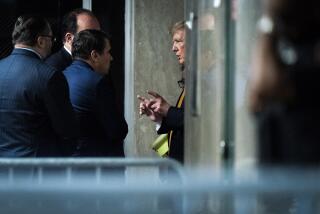Clinton Violated Accuser’s Rights in Releasing Letters, Judge Rules
- Share via
WASHINGTON — President Clinton and his top aides intentionally violated the privacy rights of former White House volunteer Kathleen Willey by publicly releasing friendly letters she had written to the president, a federal judge ruled Wednesday.
The ruling by U.S. District Judge Royce C. Lamberth, which demonstrates the lingering effects of the Monica S. Lewinsky scandal and the persistence of Judicial Watch, will force White House lawyers to answer questions from the Washington-based conservative group.
However, the finding by Lamberth, a Republican appointee who has often been at odds with the Clinton administration, that “the president committed a criminal violation of the Privacy Act” is unlikely to result in any sanctions against Clinton or his aides.
At a White House press conference Wednesday, Clinton defended his release of Willey’s letters to show that her allegations in the midst of the 1998 Lewinsky furor “were untrue.” He said that he disagrees with Lamberth’s decision “and we’ll proceed accordingly.”
White House counsel Beth Nolan said she is confident Lamberth’s ruling “will be overturned on appeal” because previous legal opinions have held that the privacy act does not cover the president’s office.
A violation of the federal Privacy Act is a misdemeanor. Most legal experts believe that a president cannot be held liable by federal courts for any criminal offense. In addition, the application of the Privacy Act in this instance is unclear, some lawyers said.
Willey’s nationally televised allegations in March 1998 that the president had made unwelcome sexual advances to her were somewhat undercut when the White House released several letters Willey had written Clinton shortly after the alleged groping incident in 1993.
The White House said that the letters showed Willey remained on cordial terms with the president after the alleged episode. Clinton denied wrongdoing.
In his news conference remarks, Clinton said: “When the decision was made to release those letters, I didn’t even have any conversation with anybody about the Privacy Act. I never thought about . . . whether it applied or not and decided to do it, reluctantly, only because it was the only way I knew to refute allegations that were made against me that were untrue.”
Other judges have ruled that the Privacy Act “does not apply to this kind of correspondence in the White House,” the president said.
Paul Rothstein, a professor of constitutional law at Georgetown University, said that privacy protections generally are waived when lawyers or public officials are attacked, as in the Willey case.
“Despite the attorney-client privilege, for example, if a client claims his lawyer did a poor job or sues him for malpractice, the lawyer may reveal confidential communications from the client which cut the other way,” Rothstein said in an interview.
“I believe the same principle would apply here,” he added.
Rothstein said he also doubted that personal letters to the president can be classified as government records covered by the Privacy Act. “I think the White House would win this argument if [it] appealed the judge’s decision,” he said.
Lamberth’s ruling came in a civil case filed by Judicial Watch on behalf of 900 former appointees of Republican administrations whose FBI security files were obtained by the Clinton White House at the beginning of his term.
Although Willey is not a party to the lawsuit, the judge allowed the plaintiffs’ lawyers wide latitude in exploring the issue of whether the White House gathered and released damaging information about political enemies.
When presidential aides balked at answering detailed questions, Lamberth ordered them to comply and made his Privacy Act ruling in connection with that order.
In so doing, however, he noted that White House lawyers contended that “the Department of Justice has, in the past, taken the position that the White House office is not subject to the Privacy Act.”
Lamberth said that, besides the president, three top aides may also have violated the act--former White House counsel Charles F.C. Ruff, former deputy counsel Cheryl Mills and presidential advisor Bruce Lindsey.
The judge said that they “had their discussions about whether the letters should be released” and communicated with the president, who authorized the release.
If the president had kept Willey’s correspondence in his own possession, the Privacy Act governing federal records might not apply, Lamberth said. But he noted that a White House official testified the correspondence was found only when Willey’s name was entered in a computer database.
In the same “Filegate” lawsuit earlier this month, Lamberth found that the Pentagon had violated the Privacy Act by revealing that Linda Tripp, who taped telephone conversations with Lewinsky about the White House intern’s affair with the president, had concealed a long-ago shoplifting arrest in obtaining her security clearance.
More to Read
Sign up for Essential California
The most important California stories and recommendations in your inbox every morning.
You may occasionally receive promotional content from the Los Angeles Times.













